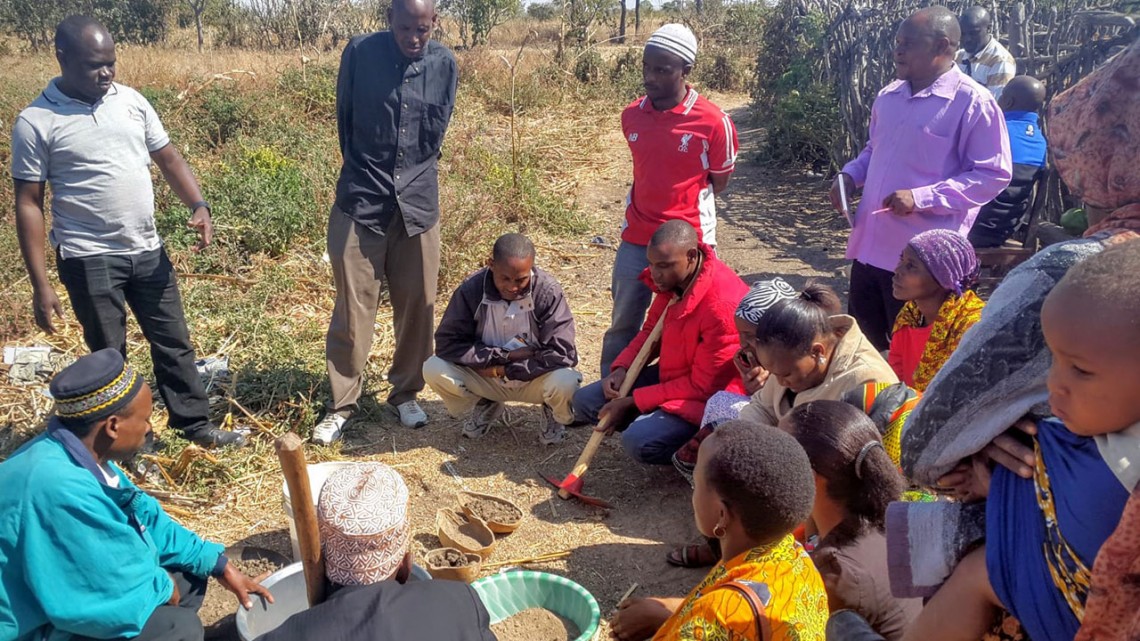
Farmers participate in curriculum testing in Tanzania.
Curriculum allows farmers to lead climate change education
By David Nutt
A Cornell-led project is helping smallholder farmers in sub-Saharan Africa engage in sustainable and equitable agricultural development through an innovative curriculum that literally puts farmers center stage.
Exploring the connections between agroecology (applying ecological principles to sustainable farming), nutrition, social equity and climate change, the curriculum is shared with the farmers through dramatic performances, experiential learning and small group discussions.
“I’ve been working in Malawi for about 20 years, doing collaborative participatory research with a local nonprofit organization run by farmers,” said Rachel Bezner Kerr, associate professor of development sociology and the project’s principal investigator. “Through various workshops and interviews and discussions, we saw there was a real gap in knowledge around the science of climate change and how it might connect to farming and other practices.”
Bezner Kerr teamed up with: Laurie Drinkwater, professor of horticulture; David Wolfe, professor of plant and soil ecology; and Sera Young, now an assistant professor of anthropology and global health at Northwestern University. Supported by an Academic Venture Fund grant from the Atkinson Center for a Sustainable Future, the team developed an interactive curriculum to address links between agroecology, nutrition, issues of gender and other social inequalities, and climate change adaptation.
The curriculum is specifically aimed at farmers who have less than secondary school education, who in turn can share the lessons with other farmers.
A resulting study, “Farming for Change: Developing a Participatory Curriculum on Agroecology, Nutrition, Climate Change and Social Equity in Malawi and Tanzania,” was published last month in Agriculture and Human Values.
Created in partnership with community development experts, farmers and academics from five countries, the curriculum was piloted with 520 smallholder farming households in Malawi and Tanzania in the summer of 2016. During initial training sessions, the farmers played an active role in helping the researchers shape the curriculum, according to co-author Marianne “Vicky” Santoso, a doctoral student in nutritional sciences who helped roll out the curriculum in Tanzania.
“We had ideas about what needed to be in the modules in this curriculum,” Santoso said, “but the farmers really taught us, ‘Oh no, talking about that isn’t helpful. Talking about it this way is more helpful.’ I was able to learn from the farmers and see them not as participants but really as project partners. We used the curriculum in the training, and then we gave it to the farmers and told them to run with it. That’s the whole idea of the project.”
This participatory spirit informs the curriculum’s use of drama and group discussions, which allow the farmers to engage with the interdisciplinary material on a personal level.
For example, one exercise encourages two farmers to assume the roles of a married couple who are anxious about the lack of rainfall, its impact on their farm and their uncertain future. The performance is followed by a group discussion about how the couple can adapt their farm to dryer or wetter conditions, and how they might financially prepare for having a child.
“This curriculum covers a lot, and the dramatic piece really helps farmers see how all of this is related, how it’s all interacting,” Santoso said. “I think it also brings levity into the training. It’s a great place to start discussions and share experiences.”
While some farmers in Tanzania were initially resistant to drama because it seemed “childish,” these conflicts ultimately led to productive community discussion.
Santoso is conducting a final survey of the participating farmers in Tanzania who have so far reported improvements in sustainable land management, food security and diet quality in growing and harvest seasons. After one year, 20 percent of those households who took part moved from food insecurity to food security.
The progress around gender equity has been more modest, Santoso said, but there are signs of encouragement. For instance, in 2018, Tanzanian men who participated in the project were spending an additional hour a day on household work and child care. By comparison, however, women still spend an average of nine hours a day on the same tasks, demonstrating just how much gender disparity still exists.
The curriculum has been translated into four languages and is freely available for nonprofits. Fifteen organizations have already downloaded it, Bezner Kerr said.
“This resource has had significant impact on food security and sustainable land management practices,” Bezner Kerr said, “and it has hopefully also raised awareness about climate change and strategies for adaptation.”
Other co-authors were: Carrie Young, Ph.D. ’17; Mufunanji Magalasi of University of Malawi; Martin Entz of University of Manitoba; Esther Lupafya and Laifolo Dakishoni of Soils, Food and Healthy Communities; and Vicki Morrone and Sieglinde S. Snapp of Michigan State University.
David Nutt is managing editor of the Atkinson Center.
Media Contact
Get Cornell news delivered right to your inbox.
Subscribe
